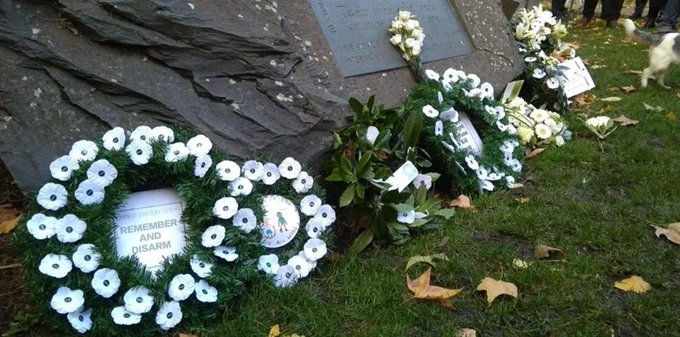It's time to revive the message "never again", writes Symon Hill.

Ahead of Remembrance Day on November 11th, various newspapers are rightly encouraging us to remember the war dead.
But the ministers and generals who will stand in socially-distanced solemnity at the Cenotaph will not only be telling us to remember. They will be encouraging us to forget. Indeed, the establishment form of “remembrance” is so narrow that the day is perilously close to becoming a festival of forgetting.
Today the Peace Pledge Union is launching this year’s white poppy campaign with a call to remember many people and wars that our rulers prefer not to talk about.
White poppies represent remembrance for all victims of war, civilian and military, past and present, of all nationalities. They also represent commitment to peace and rejection of militarism.
There are many things that we must not forget in this season of Remembrance. Here are five of them.
1. Yemen
The situation in Yemen was described by the UN as the world’s worst humanitarian catastrophe, even before the arrival of Covid. At least 20,000 people have been killed in the war and over 10 million are going hungry. According to the Mwatana Organisation for Human Rights (in Yemen) both sides have “demonstrated a clear disregard for civilians”.
Despite this, UK armed forces are training the Saudi forces bombing Yemen, both at British venues such as RAF Valley and in Saudi Arabia. Ministers boast that the UK has given £1bn in aid to Yemen since the war began in 2015. But in the same time they have allowed the export of arms worth well over six times that figure to countries fighting in Yemen (according to calculations by the Campaign Against Arms Trade, based on the government’s own data).
When Boris Johnson stands at the cenotaph, he may lay his wreath at the same time that British-trained Saudi pilots are bombing civilians in Yemen from British-made planes.
2. Other current wars
After World War One, Remembrance was linked with the message of “Never Again”. But some had an interest in watering down this message. This led to the launch of white poppies in 1933. One of the founders of white poppies, Eleanor Barton, called for a commitment to “that ‘Never Again’ spirit that was strong in 1918, but seems to grow weaker as years go on”.
Remembering current wars should mean doing something about them. Remembering the war in Nagorno-Karabakh should lead us to challenge the UK government’s arms policy, which has allowed them to arm both sides in that war.
3. Colonial wars of the past
This year marks the 100th anniversary of the first aerial bombardment of Iraq by British troops: a key moment in the development of aerial warfare against civilians, which has become so common since then. One of those involved was Arthur “Bomber” Harris, who went on to preside over the killing of thousands of German civilians in 1943-45, as if you could defeat Fascism with Fascist methods.
The Black Lives Matter movement reminds us to look colonial history in the face and be honest about it. We must not forget colonial atrocities on Remembrance Day.
4. Complexities of the world wars
Glib phrases such as “fighting for freedom” serve to cover up the horrors of the world wars and their messy moral complexities. Many people recognise the unfairness of World War One, but when it comes to World War Two, we are still expected not to probe behind the claim that it was all about fighting Fascism.
The British establishment’s friendship with Fascism before the war is rarely mentioned (British companies were supplying arms to Mussolini in the 1930s, despite opposition from the Peace Pledge Union and others). We rightly remember the British forces personnel killed and wounded, though civilian victims of the Blitz tend to be mentioned on Remembrance Day only in passing. Suffering that doesn’t fit into this narrative is ignored, such as the Bengal Famine and the mass rape of German women by Soviet troops allied with the UK.
5. Veterans
Politicians trip over each to talk their admiration for veterans. Government statements along these lines would be easier to believe if there were not 13,000 homeless veterans in the UK and if the mental health services that many of them need were not appallingly underfunded.
The red poppy appeal raises money to help veterans. Such charity is needed only because the state that sent them to war is not helping them. Figures released today reveal that the UK has the second highest military spending in the whole of NATO – yet ministers dump veterans to rely on charity tin-rattling.
White poppy wearers are sometimes mistakenly described as being “anti-Remembrance”. Nothing could be less true. We wear white poppies precisely because we want to remember the horrific realities of war – and to act accordingly.
Symon Hill is Campaigns Manager of the Peace Pledge Union and a history tutor for the Workers’ Educational Association. You can order white poppies from the Peace Pledge Union here.
Left Foot Forward doesn't have the backing of big business or billionaires. We rely on the kind and generous support of ordinary people like you.
You can support hard-hitting journalism that holds the right to account, provides a forum for debate among progressives, and covers the stories the rest of the media ignore. Donate today.



